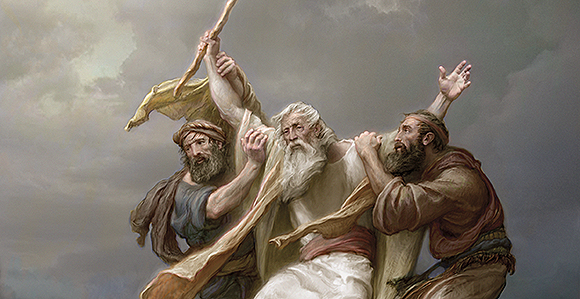Viewpoint: Uphold the Hands of Our Prophet
Contributed By the Church News

Aaron and Hur upholding Moses’s hands to support him as a prophet.
Article Highlights
- We should sustain President Nelson just as disciples of Christ sustained prophets like Moses and Elijah.
- We can sustain the prophet by praying for him and heeding his counsel.
“In a world threatened by a famine of righteousness and spiritual starvation, we have been commanded to sustain the prophet. As we give heed to, uphold, and affirm prophetic word, we witness that we have the faith to humbly submit to the will, the wisdom, and the timing of the Lord.” —Sister Carol F. McConkie of the Young Women General Presidency
When the children of Israel went to battle against their enemies in Rephidim, Moses stood atop a hill and raised the rod of his authority in his hand.
“And it came to pass, when Moses held up his hand, that Israel prevailed: and when he let down his hand, Amalek prevailed” (Exodus 17:11).

As the battle waged, Moses’s hands became heavy so Aaron and Hur “stayed up his hands, the one on the one side, and the other on the other side; and his hands were steady until the going down of the sun” (Exodus 17:12). The prophet was upheld so that the enemies of the children of Israel could not prevail over the people of the Most High God.
On January 14, President Russell M. Nelson was set apart and ordained the 17th President of The Church of Jesus Christ of Latter-day Saints. Soon we will participate in a solemn assembly where we will signify by the uplifted hand our willingness to, like Aaron and Hur, uphold and sustain the prophet of God on the earth.
But as members of the Church, how do we do our part in “supporting” the hands of the prophet? President Joseph F. Smith explained, “It is an important duty resting upon the Saints who … sustain the authorities of the Church, to do so not only by the lifting of the hand, the mere form, but in deed and in truth” (Teachings of Presidents of the Church: Joseph F. Smith [1998], 211).
President Russell M. Nelson, then President of the Quorum of the Twelve Apostles, noted that members of the Church do not vote on Church leaders but have the privilege of sustaining them. “Our sustaining of prophets is a personal commitment that we will do our utmost to uphold their prophetic priorities. Our sustaining is an oath-like indication that we recognize their calling as a prophet to be legitimate and binding upon us.”
He then quoted then-Elder George Albert Smith, who said, “The obligation that we make when we raise our hands … is a most sacred one. It does not mean that we will go quietly on our way and be willing that the prophet of the Lord shall direct this work, but it means … that we will stand behind him; we will pray for him; we will defend his good name, and we will strive to carry out his instructions as the Lord shall direct” (“Sustaining the Prophets,” Oct. 2014 general conference).
The Lord promises great blessings to those who hearken to the counsel of His prophets. On the day the Church was first organized on April 6, 1830, the Lord revealed:
“Wherefore, meaning the church, thou shalt give heed unto all [the prophet’s] words and commandments which he shall give unto you as he receiveth them, walking in all holiness before me;
“For his word ye shall receive, as if from mine own mouth, in all patience and faith.
“For by doing these things the gates of hell shall not prevail against you; yea, and the Lord God will disperse the powers of darkness from before you, and cause the heavens to shake for your good, and his name’s glory” (D&C 21:4–6).
The scriptures are replete with examples of the consequences that befall those who choose to obey or ignore the words of His chosen servants. In the Bible, the Lord instructs the prophet Elijah to go to Zarephath during a time of famine, where he will find a widow whom God had commanded to sustain him. When Elijah meets her, he tells her, “Bring me, I pray thee, a morsel of bread in thine hand.
“And she said, As the Lord thy God liveth, I have not a cake, but an handful of meal in a barrel, and a little oil in a cruse: and, behold, I am gathering two sticks, that I may go in and dress it for me and my son, that we may eat it, and die.”
Elijah tells her to “fear not; go and do as thou hast said” and then promises, “For thus saith the Lord God of Israel, The barrel of meal shall not waste, neither shall the cruse of oil fail” (1 Kings 17:11–14).
“The Lord gave the widow the opportunity to choose to believe and obey the words of the prophet,” Sister Carol F. McConkie of the Young Women General Presidency explained. “In a world threatened by a famine of righteousness and spiritual starvation, we have been commanded to sustain the prophet. As we give heed to, uphold, and affirm prophetic word, we witness that we have the faith to humbly submit to the will, the wisdom, and the timing of the Lord.”
Sometimes the counsel of the prophet might seem “unreasonable, inconvenient, and uncomfortable,” Sister McConkie continued. “According to the world’s standards, following the prophet may be unpopular, politically incorrect, or socially unacceptable. But following the prophet is always right. ‘For as the heavens are higher than the earth, so are my ways higher than your ways, and my thoughts than your thoughts’ (Isaiah 55:9)” (“Live according to the Words of the Prophets,” Oct. 2014 general conference).
For the widow of Zarephath, obedience to Elijah saved the life of her and her son. As promised, “she, and he, and her house, did eat many days … according to the word of the Lord, which he spake by Elijah” (1 Kings 17:15–16).
President Harold B. Lee, then a member of the First Presidency, cited the example of Moses standing atop the hill at Rephidim and said: “The hands of [the President of the Church] may grow weary. They may tend to droop at times because of his heavy responsibilities; but as we uphold his hands (D&C 81:5), and as we lead under his direction, by his side, the gates of hell will not prevail against you and against Israel (D&C 21:6). Your safety and ours depends upon whether or not we follow the ones whom the Lord has placed to preside over His Church. He knows whom He wants to preside over this Church, and He will make no mistake. The Lord doesn’t do things by accident. He has never done anything accidentally.”
“Let’s keep our eye on the President of the Church and uphold his hands” (in Conference Report, Oct. 1970, 152–53).
